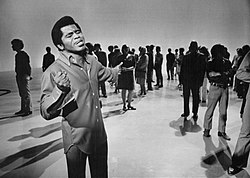| Sex Machine | ||||
|---|---|---|---|---|
 | ||||
| Studio album and live album by | ||||
| Released | September 1970 | |||
| Recorded |
| |||
| Genre | ||||
| Length | 64:29 | |||
| Label | King 1115 | |||
| Producer | James Brown | |||
| James Brown chronology | ||||
| ||||
| James Brown live albums chronology | ||||
| ||||
| Singles from Sex Machine | ||||
| ||||
| Review scores | |
|---|---|
| Source | Rating |
| Allmusic | |
| Billboard | (favorable) [4] |
| Christgau's Record Guide | A [5] |
| Rhapsody | (favorable) [6] |
| Rolling Stone | |
| Spin | (favorable) [8] |
| Yahoo! Music | (favorable) [9] |
| Zagat Survey | |
| Sputnikmusic | |
Sex Machine is a 1970 double album by James Brown. It showcases the playing of the original J.B.'s lineup featuring Bootsy and Catfish Collins, [12] and includes an 11-minute rendition of the album's title song,different from the original recording of the title song which was released as a two-part single in 1970.
Contents
Sex Machine purports to be a live recording. However,the first LP's worth of material consists of tracks recorded in studio settings with added reverberation and overdubbed applause (some of which subsequently were released in unadulterated mixes,most notably on the 1996 Funk Power compilation CD.). All but one track of the second LP apparently were recorded live in concert in Brown's hometown of Augusta,Georgia,although this material,too,features added reverb and overdubbed applause.[ citation needed ]
Sex Machine is often considered to be one of the greatest and most important funk records of all time,and arguably the high point of Brown's creative heyday from 1967 to 1971. It was ranked 1st in SPIN magazine's 25 greatest albums of all time in 1989,and 96th in a 2005 survey held by British television's Channel 4 to determine the 100 greatest albums of all time. [13] Sex Machine was also voted the 34th greatest album of all time in a VH1 poll of over 700 musicians,songwriters,disc jockeys,radio programmers,and critics in 2003. [14] In Rolling Stone's 2020 edition of The 500 Greatest Albums of All Time,it was ranked number 439. [15]
